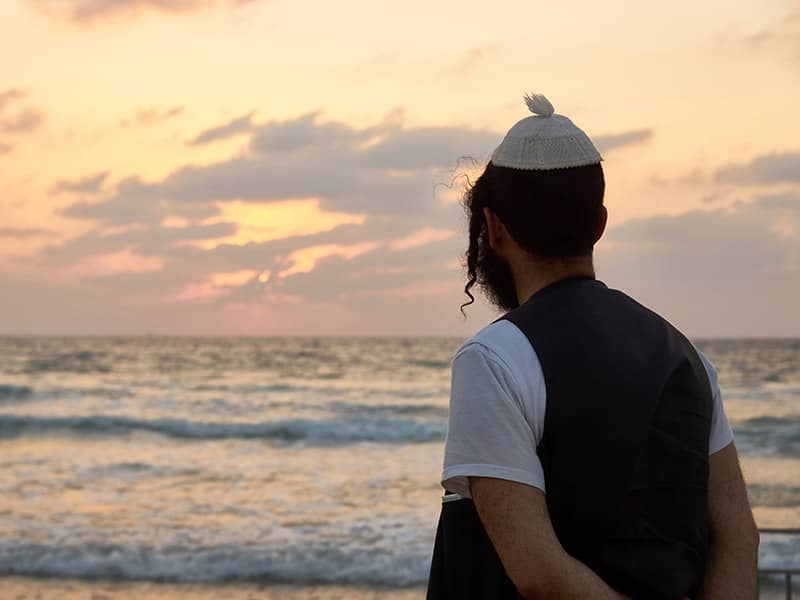By the time Antiochus reaches the seventh son, a boy of no more than two or three, he is thoroughly humiliated by his inability to bend the sons to his will. He offers the boy a subterfuge to save his own face and the boy's life: he will throw down his signet ring and the boy will pick it up so that it merely appears that he is bowing down. The little boy rejects even the appearance of idol worship. Before he is taken away to be executed, his mother kisses him and tells him, "Go to Abraham your father and tell him for me, 'You built one altar; I built seven. In the end, you did not sacrifice your son; I sacrificed seven.'"
How can we understand Hanna's words? Did she have nothing more to worry about at that moment of heartbreak than bragging rights over Abraham? Hanna did not seek to prove to her forefather Abraham that she was greater than he. Her message to him was: Because of what you did thousands of years ago, when you offered your beloved son Isaac, a simple Jewish woman would one day find the strength to offer seven sons in a single day. You planted an eternal capacity for mesirat nefesh (self-sacrifice) in the Jewish people.
Indeed, over the millennia, Jews have been the symbol of mesirat nefesh for the entire world. Without that capacity we could never have survived 2,000 years of exile.
The Jews of Israel are going to need all the capacity for old-fashioned mesirat nefesh that we can muster. No one within government or outside has a credible plan to end suicide bombings. After 50 years of war, we face 50 more.
Nearly a decade ago, Israel embarked on the Oslo process after four years of the first intifada. Things could not get any worse, we told one another, and the time had come to try a new approach.
In terms of Jewish lives lost to terrorism, the first two and a half years after the Oslo signing were more costly than in the preceding decade. From there the situation has only deteriorated, with more than 230 Jewish lives lost in the past 14 months of non-stop violence.
Born out of despair, Oslo, like other messianic movements in Jewish history, soon gave way to mass euphoria, as we convinced ourselves that history had moved into a new stage and that peace would soon reign in our region.
Virtually no one believes that anymore. We have bunkered down for the long run.
Not only will there be no peace with this generation of Palestinians, it is hard to see how there can be peace with the next generation either. Palestinian children are indoctrinated to believe that every inch of land from the Jordan to the Mediterranean will one day be theirs, and that Jews are illegitimate interlopers anywhere and everywhere within that area.
No doubt we are safer now that the scales have dropped from our eyes. It is better to recognize that our enemies will not go away or cease to be our enemies than to delude ourselves otherwise. Men and animals never fight so fiercely as when their backs are to the wall. The recognition that we have no choice but to fight if we wish to remain here will not in itself cure the low morale that led to Oslo. For many Israelis, there is an alternative to fighting. They can leave for places where they will not be targets their entire lives. More than a million Israelis living in New York, Los Angeles and Miami have already done so.
Unfortunately, the evidence of such a vision emerging is not encouraging. Little more than a year ago, an Israeli government was willing to cede total control over the Temple Mount to the Palestinians. Today, under a nationalist government, Palestinian efforts to destroy all traces of the Temples that once stood there proceed apace. The indifference of both the government and populace betoken a lack of feeling of connection to our holiest site.
The Israel Broadcasting Authority ordered a series of ads urging Jews to recite Psalms, which ran prior to Rosh Hashana, removed from the airwaves because the subject is too controversial. (No such infirmity was found to ads by the Conservative and Reform movements for their High Holiday services.) This week a Jerusalem magistrate issued an ex parte restraining order against the lighting of a Hanukkah menorah at the entrance to an apartment building (the halachically preferred place for lighting.) Under traditional equity doctrine, such an order, issued without the restrained party being present, requires a show of great and irreparable damage by the moving party. In this case, the complaining party claimed that the smell from the hanukkia invaded his apartment two flights above and created a health hazard. [The same magistrate has since revoked the injunction. Read more.]
One does not know which is sadder: That a Jewish judge does not know that the traditional olive oil menora is virtually smokeless and odorless, or that he does, and nevertheless finds the menorah repugnant.
If, in the Jewish state, the destruction of the Temple Mount is greeted with yawns, the recitation of Psalms is a subject of ideological controversy, and viewing a Hanukkah menorah constitutes irreparable harm, where are we going to find the connection to our past necessary to ensure our future?

